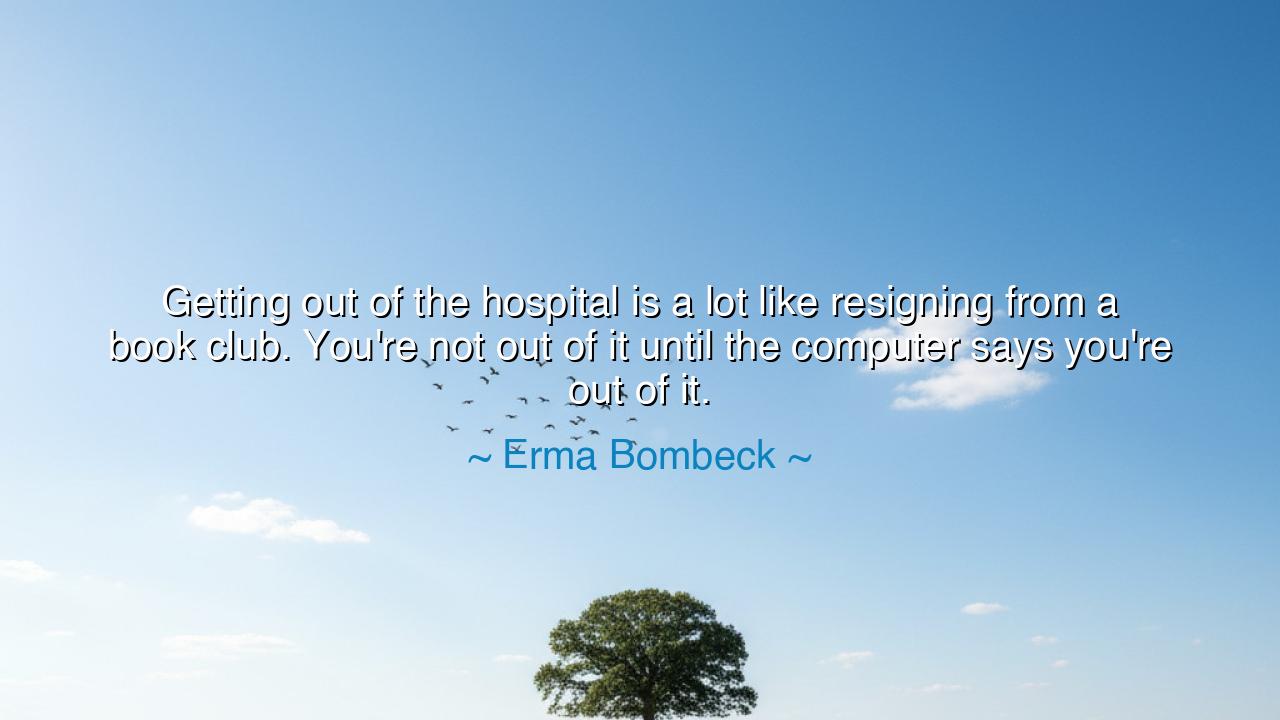
Getting out of the hospital is a lot like resigning from a book
Getting out of the hospital is a lot like resigning from a book club. You're not out of it until the computer says you're out of it.






Hear, O seekers of wisdom, the voice of Erma Bombeck, the great humorist of the common life, who declared with both laughter and lament: “Getting out of the hospital is a lot like resigning from a book club. You’re not out of it until the computer says you’re out of it.” In her playful words shines a truth wrapped in jest: that in the age of bureaucracy, freedom is not measured by flesh or will, but by the authority of records, signatures, and machines. What the body proclaims is often ignored until the system itself agrees. Thus Bombeck reminds us that even healing and liberty are entangled in the chains of paperwork.
The hospital, in ancient thought, should be the temple of recovery, the place where suffering is relieved and healing completed. Yet in modern times, it is also a fortress of forms, billing codes, and digital confirmations. Bombeck’s jest compares this to the trivial—but strangely similar—ordeal of leaving a book club, where one’s absence is not respected until the list itself is amended. The meaning is clear: institutions, whether sacred or mundane, often value the record above the reality, and one is not truly free until the system consents.
This paradox is not new. Consider the tale of the Roman soldier who, after serving his term, sought release from his legion. Though his years of duty were complete, he was not free until the records of Rome declared it so. Many such men, though scarred from campaigns and longing for home, waited weeks or months in bureaucratic limbo, their lives suspended until the empire’s scrolls bore their names as discharged. In this, as in Bombeck’s words, the truth resounds: authority does not always rest in the reality of life, but in the record that life leaves behind.
Her wit also carries a sting of compassion. For the patient, healed in body yet bound by delay, the waiting becomes another kind of suffering. And for the ordinary man or woman caught in systems great or small, the story is the same. You may believe yourself finished with a burden, yet until the institution acknowledges it, you remain tethered. Bombeck makes us laugh, but her laughter masks a sigh: a recognition of the small indignities that weigh upon human life in the age of administration.
Yet let us not despair, for her words also remind us of resilience. If one cannot always control the wheels of bureaucracy, one can control the spirit with which it is endured. The great souls of history bore far heavier chains. Recall Nelson Mandela, who though unjustly imprisoned for twenty-seven years, declared himself free within his spirit long before the papers of the state acknowledged his release. His story reveals that though the computer may delay, the heart can transcend.
The lesson, then, is both practical and profound. Accept that systems may lag behind reality, and prepare yourself with patience, humor, and perseverance. Do not surrender your peace to forms and files. Instead, cultivate resilience, finding laughter even in absurdity, as Bombeck did. In your own life, when delays frustrate you, let humor lighten the burden, for laughter is a shield against despair.
And so the wisdom stands: you are not out until the computer says you are out. This is the world we inherit, yet it need not master us. Let us face it with patience, endure it with humor, and rise above it with dignity. For in the end, systems may bind your body with delay, but your spirit remains free the moment you choose to let it soar.






AAdministratorAdministrator
Welcome, honored guests. Please leave a comment, we will respond soon